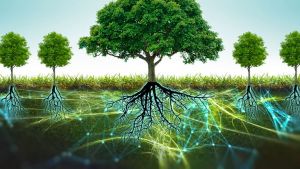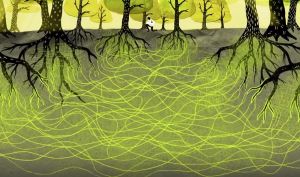Mycelium: Difference between revisions
Florez4747 (talk | contribs) No edit summary |
Florez4747 (talk | contribs) |
||
| Line 14: | Line 14: | ||
= Mycelium and the Environment = | = Mycelium and the Environment = | ||
Habitats across the Earth depend upon Mycelium, a keystone species, to sustain themselves and their soils.<Ref>https://www.nature.com/articles/s41598-019-43980-3</Ref> Mycelium hold soils together and help aerate them; Mycelium breaks down debris to build new blocks of soil after ecological catastrophes. | Habitats across the Earth depend upon Mycelium, a keystone species, to sustain themselves and their soils.<Ref>https://www.nature.com/articles/s41598-019-43980-3</Ref> Mycelium hold soils together and help aerate them; Mycelium breaks down debris to build new blocks of soil after ecological catastrophes created by humans or otherwise. Mycelial networks partner with bacteria and other microorganisms to break down organic material creating stronger structures of soil. <Ref>Paul Stamets, Mycelium Running, Page 11</Ref> | ||
= Mycophobia = | = Mycophobia = | ||
Revision as of 18:54, 30 December 2022
Natural Intelligence
Understanding how mycelium works as an organism and the role it plays in our ecosystems has notably shaped how intelligence itself is defined.[1] As the neurological network of nature:
interlacing mosaics of mycelium infuse habitats with information-sharing membranes. These membranes are aware, react to change, and collectively have the long-term health of the host environment in mind. The mycelium stays in constant molecular communication with its environment, devising diverse enzymatic and chemical responses to complex challenges. [2]
The Mycelial archetype
Structures similar to Mycelium can be seen throughout Mother Earth and the universe. Some structures resembling Mycelial networks include patterns of hurricanes, dark matter and the internet, further Mycelial networks resemble patterns predicted by string theory. [3]
Mycelium and the Environment
Habitats across the Earth depend upon Mycelium, a keystone species, to sustain themselves and their soils.[4] Mycelium hold soils together and help aerate them; Mycelium breaks down debris to build new blocks of soil after ecological catastrophes created by humans or otherwise. Mycelial networks partner with bacteria and other microorganisms to break down organic material creating stronger structures of soil. [5]
Mycophobia
The fear of mycelium (typically implicit) as usually manifested through a fear of their fruiting bodies (mushrooms) is known as mycophobia.
Sources
Pyrolize
"This Underground Economy Exists in a Secret Fungi Kingdom" (https://www.youtube.com/watch?v=WWD_1Nq6iwQ)
"Fungal Banking with Biochar and Hugelkultur" (https://www.youtube.com/watch?v=EoKS07Y1ASk)
"The Organic Internet of a Mycelium Network: Suzanne Simard, Paul Stamets, and Terence Mackenna" (https://www.youtube.com/watch?v=rGyECGJqWDU)
Cited
- ↑ https://microdose-journey.com/mycelium-networks/
- ↑ Mycelium Running, by Paul Stamets
- ↑ Paul Stamets, Mycelium Running, Page 9
- ↑ https://www.nature.com/articles/s41598-019-43980-3
- ↑ Paul Stamets, Mycelium Running, Page 11

